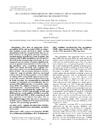Please use this identifier to cite or link to this item:
https://accedacris.ulpgc.es/jspui/handle/10553/565
| Title: | Influence of polyamines on the sporulation of Grateloupia (Halymeniaceae, Rhodophyta) | Authors: | Sacramento Trujillo, Alicia García-Jiménez, Pilar Alcázar, Rubén Tiburcio, Antonio F. Robaina, Rafael R. |
Keywords: | Poliaminas | Issue Date: | 2004 | Project: | Mecanismos Moleculares Responsables de Los Efectos de Las Poliaminas Sobre la Reproduccion y El Estres Salino en Macroalgas PI2001/129 (Gobierno de las Islas Canarias) INNOVA (Fundación Universitaria de Las Palmas de Gran Canaria) |
Journal: | Journal of Phycology | Abstract: | Polyamines (PAs) such as putrescine (PUT), spermidine (SPD), and spermine (SPM) are ubiquitous aliphatic amines involved in widely varying physiological behavior, but particularly they are actively involved in cell growth, division, and differentiation during reproductive events in plants. The contents of PUT, SPD, and SPM in infertile and fertile thalli of the red macroalga Grateloupia sp. were compared, and the results revealed a significant decrease in quantity from infertile to fertile status. At the enzymatic level, L-ornithine decarboxylase (ODC) was mainly detected, and L-arginine decarboxylase activity was not diminished by the inhibition of ODC. The maximum enzymatic activities, within the range of activities observed, correlated with the lower levels of polyamines in fertile thalli. In culture, SPM promoted the maturation of cystocarps to the eventual liberation of spores from aseptic fertile explants. PAs accumulated in cultivated explants as compared with noncultivated, but exogenous SPM addition further increased the endogenous SPM. The addition of berenyl, cordycepin, cyclohexylamine, dicyclohexylamine, and aurintricarboxylic acid blocked the synthesis in culture at the level of PUT, and partially at SPD and SPM synthesis, but the addition of SPM restored the levels of SPD and SPM as SPM accumulated, and they appeared to interconvert each other. The results obtained suggest that the culture in presence of SPM restored a deficient SPM situation in fertile explants, thus promoting sporulation. | URI: | https://accedacris.ulpgc.es/handle/10553/565 | ISSN: | 0022-3646 | DOI: | 10.1111/j.1529-8817.2004.03183.x | Source: | Journal of Phycology[ISSN 0022-3646],v. 40, p. 887-894 |
| Appears in Collections: | Artículos |
SCOPUSTM
Citations
36
checked on Jun 8, 2025
WEB OF SCIENCETM
Citations
30
checked on Jan 18, 2026
Page view(s)
294
checked on Jan 15, 2026
Download(s)
296
checked on Jan 15, 2026
Google ScholarTM
Check
Altmetric
Share
Export metadata
Items in accedaCRIS are protected by copyright, with all rights reserved, unless otherwise indicated.
